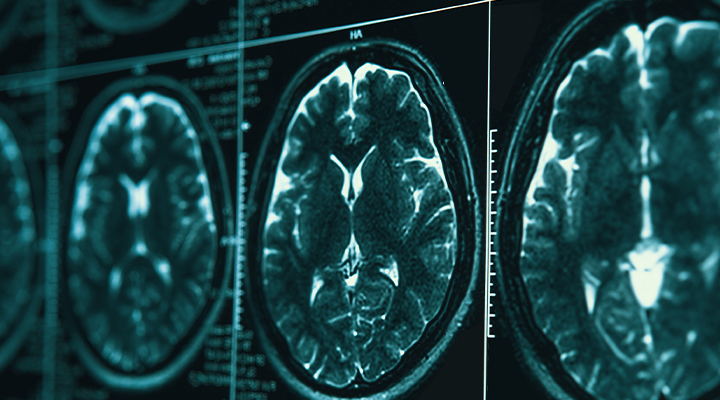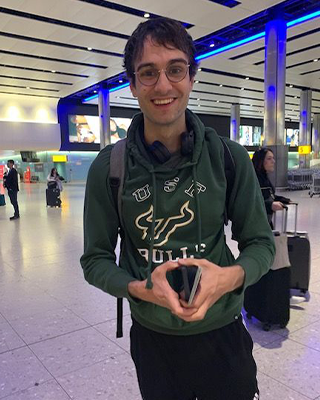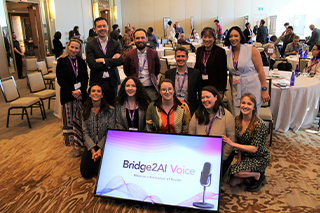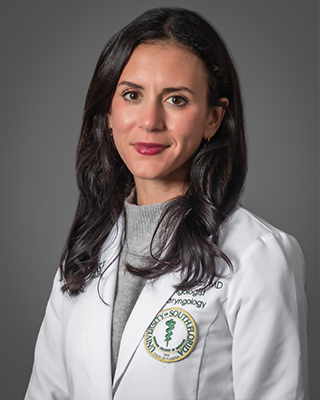Global Spotlights
An effort to use AI to diagnose Alzheimer’s brings a global team to Tampa

NIH/Oxford PhD student James Anibal is a visiting scholar to USF working to identify biomarkers of health from voice data and AI.
TAMPA, FL (June 27, 2024) -- Oxford University PhD student James Anibal is intrigued by the idea of using artificial intelligence to find novel biomarkers of health, enabling easier ways to diagnose diseases—especially in populations who don’t have easy access to healthcare. He’s part of a select and specialized PhD program supported by the National Institutes of Health (NIH) and the University of Oxford to accelerate training for students committed to biomedical innovation.

USF World’s Bessie Skoures had a chance encounter with James Anibal, wearing a USF sweatshirt, at Heathrow Airport on her way to meet with London-based alumni. He’s now the newest USF Network UK member!
When USF Morsani College of Medicine Assistant Professor Yaël Bensoussan was awarded an NIH grant developing artificial intelligence (AI) tools from voice
data, Anibal joined the project’s international research team and for the past eight months has been a visiting researcher with USF, working on
a project that holds the promise of improving how diseases are diagnosed and managed
with digital health technology.
For Anibal, the USF-led project not only is a chance to advance a field of research that’s been the focus of his academic career but an opportunity to bring more students into the emerging field. Anibal is already building a global reputation in the world of machine learning for education. In 2022, he was part of a UK team that was a finalist in the Microsoft Imagine Cup World Finals with their AI-enabled, personalized education system, Sia Precision Education, which has since become a venture-backed startup company.
This summer, Anibal will be among the researchers leading a summer school for medical, health and STEM undergraduates and graduates using AI in voice research. The students will be challenged to design user-friendly technology from digital records of voices, breathing and other biomarkers, culminating in a hackathon in August in which they will develop and present their ideas.
For Anibal, who will finish his doctoral program at the NIH/Oxford in 2025, the engagement with USF and the Bridge2AI program is a unique opportunity to create new intersection of technology and health care as the use of machine learning surges in health care fields.

Photo by Peter Cleary, Weill Cornell College of Medicine
“Voice has a lot of potential in clinical AI because sound data is easy to collect,” Anibal said. “If we are going to spend so much time and resources on the development of AI, we should do it in a way which is scalable and can be integrated smoothly into clinical workflows.”
“When someone communicates, three types of information are created: There’s the voice, the speech – the way they put words together which can indicate pain or neurological function, and the meaning of the words – the language,” Anibal says. “There’s a lot of information that can be collected from that multi-channel approach...If I ask you: How is your health? There’s a lot to be learned from how you sound, what you said, and how you said it.”

USF Health otolaryngologist Bensoussan is working with Weill Cornell Medicine in New York in leading the project, which involves a dozen institutions in the U.S. and Canada as well as French American AI biotech startup Owkin. The project is part of the NIH’s Bridge2AI initiative, which will invest $130 million over four years, pending the availability of funds, to accelerate the widespread use of artificial intelligence by the biomedical and behavioral research communities.
The Bridge2AI project is not the only collaboration between Anibal and Bensoussan. They have previously worked together on a project to predict COVID-19 variant status from speakers in YouTube videos and, more recently, on an international project to collect voice biomarkers from low-resource healthcare settings.
And while AI is moving fast in its applications in many fields and uses, Anibal says that clinical machine learning is just one part of a complex process that needs to keep patient safety and privacy rights first in mind. He believes that AI should ideally be used to improve the efficiency and effectiveness of clinical processes without shifting the delivery of healthcare away from trusted medical professionals.
“These powerful AI systems are trained on years’ worth of prior data” he said. “I see AI as a support tool to make a medical practice more efficient and more precise. But the ultimate decision remains in the hands of the patient and their healthcare provider.”